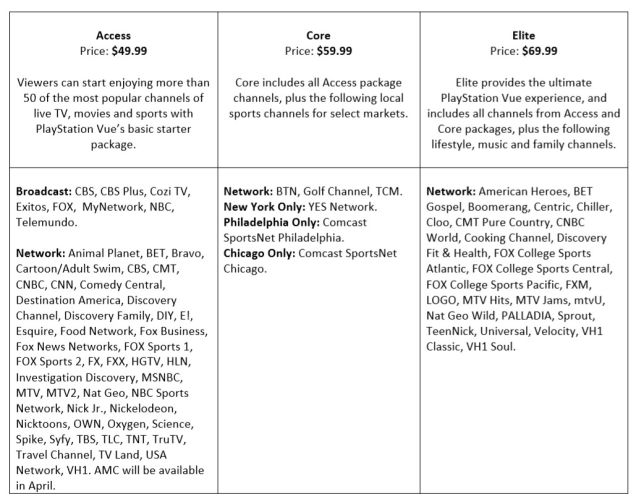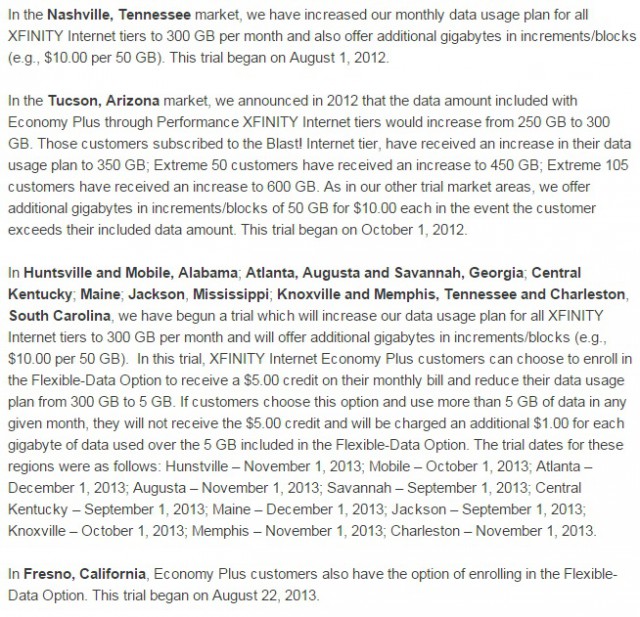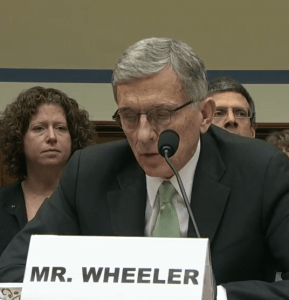
Wheeler at this morning’s hearing.
Revenge-seeking Republicans spent more than two hours this morning grilling the chairman of the Federal Communications Commission, Thomas Wheeler, in the first of five Congressional hearings on the agency to be held over the next two weeks.
Rep. Jason Chaffetz (R-Utah), chairman of the House Oversight and Government Reform Committee, accused the FCC of a lack of transparency regarding the recent release of Net Neutrality rules that universally ban paid fast lanes and revenue-based traffic management. Republicans accused the Obama Administration of secretly pressuring Wheeler to adopt strong Open Internet protections.
“The lack of transparency surrounding the open Internet rule-making process raises a lot of questions,” said Chaffetz.
Chaffetz, most of his Republican colleagues, and many large telecom companies object to the Net Neutrality rules and suggest Wheeler’s rumored original lighter-touch “hybrid approach” was swamped by White House objections and replaced with a much stronger Open Internet policy framed around Title II reclassification of broadband as a telecommunications service at the urging of the administration.
Chaffetz dismissed comments from four million Americans writing the FCC in favor of Net Neutrality claiming the writers did not recommend Title II reclassification of broadband, despite the fact many suggested exactly that.
To bolster Republican arguments that President Obama exercised undue influence on an independent agency, Chaffetz’s committee selectively released portions of now-unredacted email exchanges between Wheeler, agency officials, Congress, and the White House. It also included a partial e-mail exchange involving AT&T’s top lobbyist, Jim Cicconi, who is evidently on a first-name basis with some of the FCC’s highest officials, including Wheeler’s senior counselor, Philip Verveer.
In response to a November 10 news release featuring comments from FCC chairman Wheeler in response to President Barack Obama’s statements of support for strong Net Neutrality, Cicconi sent a concerned email to Wheeler’s office the Republicans chose not to disclose. But they did include Verveer’s response:
Jim,
We’re trying to schedule a conversation about this morning’s developments for some time this afternoon. I hope we’re able to connect.
Phil
In response to that, Cicconi fired off this quick response from his iPad:
I hope so too.
Now I at least understand why you pushed the hybrid.
This is awful. And bad for any semblance of agency independence too.
Too many people saw Zients going in to meet with Tom last week.
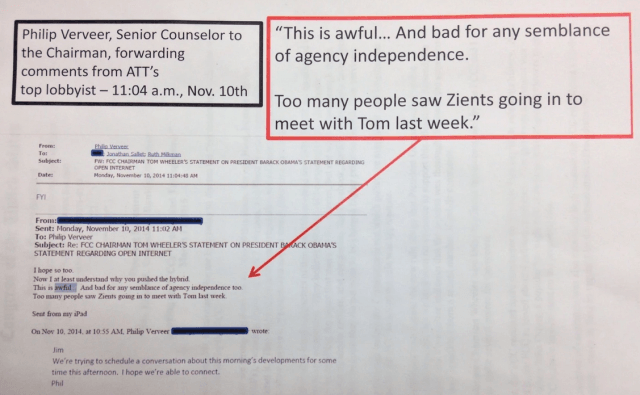
Cicconi is referring to Jeff Zients, a White House economic adviser, who met with Wheeler on Nov. 6. In Cicconi’s mind, and by extension the Republicans at today’s House hearing, that meeting represented “undue pressure from the White House.”
Republicans also attempted to prove the FCC and the White House closely collaborated on a rollout of Net Neutrality using an email from an irritated Wheeler to his senior staff shortly after his driveway was blocked by Net Neutrality activists:
FYI, Isn’t it interesting:
- The day of the demonstration just happens to be the day folks take action at my house.
- The video of [President Obama] just happens to end up on the same message as the video from [the president].
- The White House sends this email to their supporter list asking “pass this on to anyone who cares about saving the Internet.”
Hmmm….
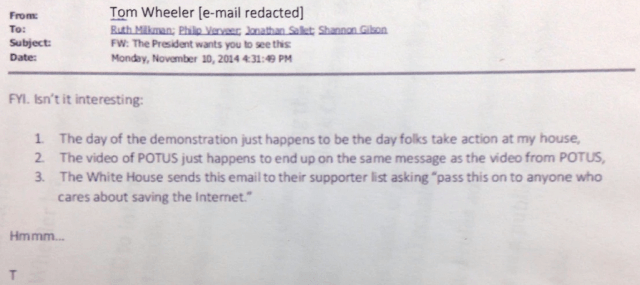
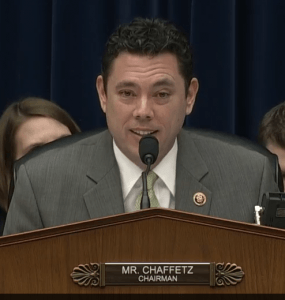
Chaffetz
But Wheeler’s message suggests he was never aware of the White House’s campaign to bolster Net Neutrality, much less a part of it.
A third email from then Sen. Majority Leader Harry Reid’s office revealed the senator was no fan of Title II reclassification of broadband to protect Net Neutrality. David Krone, Reid’s chief of staff, lectured Wheeler about keeping strong Net Neutrality off the table because it creates “problems for us.”
In May 2014, chairman Wheeler announced his plans for a hybrid approach to Net Neutrality that would likely combine bans on censorship with permission for Internet providers to set up paid fast lanes for content producers like Netflix.
Initial media reports of Wheeler’s intentions sparked a major backlash against the proposal among Net Neutrality advocates.
In a May 15, 2014 email exchange with Wheeler, Krone attempted to buck up Wheeler and his “third way” Net Neutrality plan once in the morning before it was announced and later that evening after the proposal took heavy fire in the press.
9:26 am (Krone to Wheeler)
Good luck today.
Not sure how things have landed but I trust you to make it work. Please shout if you need anything.
Spoke again with the [White House] and told them to back off Title II. Went through once again the problems it creates for us.
6:15pm (Krone to Wheeler)
Too funny. I literally just watched your remarks from this morning. Spot on. Thank you!!!
P.S. Zients was definitely reacting to press reports. Or, should I say, overreacting. My main point to the [White House] is how can you declare today that regulations written in the 1930’s will work fine for 2014 technology. Let Tom do his job and this will be fine.
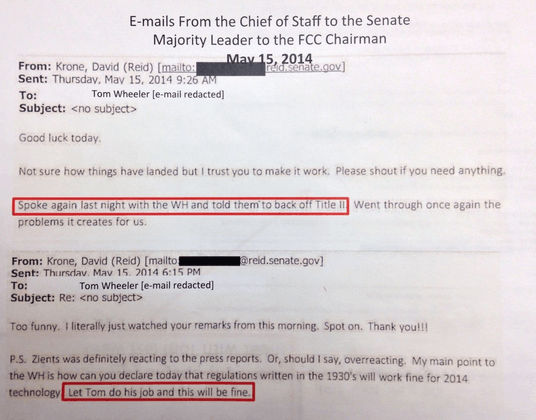
Another email exchange between Wheeler and John Podesta, counselor to the president, referenced a New York Times story that signaled Wheeler was backpedaling on Net Neutrality, a story later proven inaccurate.
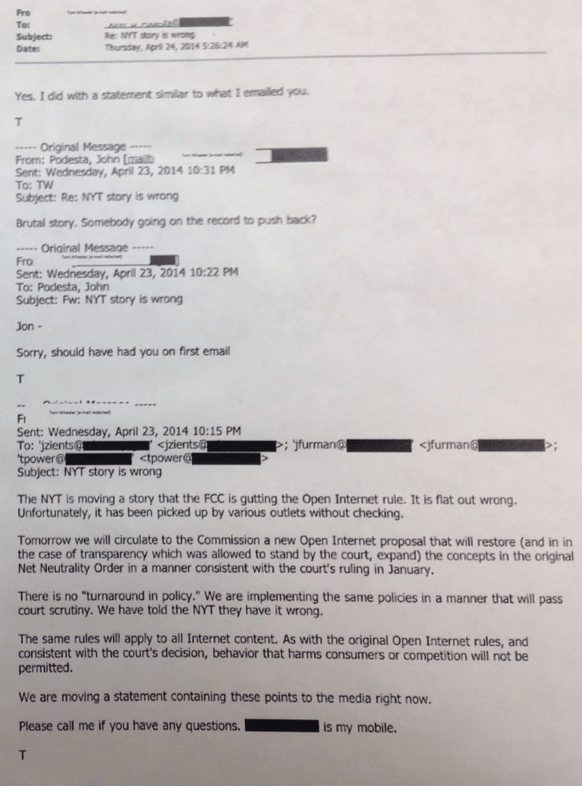
At this morning’s hearing, Wheeler pushed back against the Republican accusations.
“There were no secret instructions from the White House,” Wheeler said. “I did not, as CEO of an independent agency, feel obligated to follow the president’s recommendation.”
C-SPAN carried this morning’s hearing with FCC chairman Thomas Wheeler appearing before the House Oversight and Government Reform Committee. (2 hours, 41 minutes)
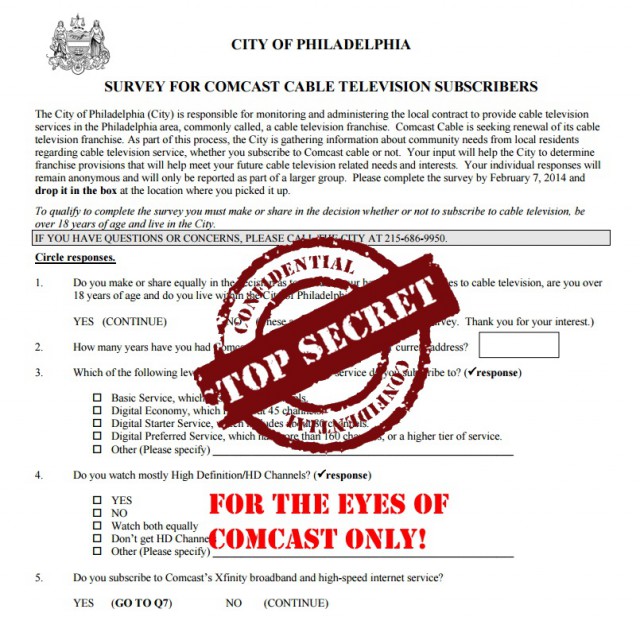 Philadelphia Mayor Michael Nutter has gone all out for Comcast, headquartered in the city he oversees. Not only has Nutter organized 51 mayors to sign a joint letter supporting Comcast’s $45 billion bid to take control of Time Warner Cable, he is also helping protect the cable company from embarrassing revelations about its performance in the city.
Philadelphia Mayor Michael Nutter has gone all out for Comcast, headquartered in the city he oversees. Not only has Nutter organized 51 mayors to sign a joint letter supporting Comcast’s $45 billion bid to take control of Time Warner Cable, he is also helping protect the cable company from embarrassing revelations about its performance in the city.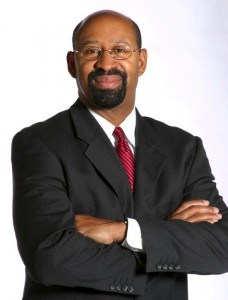 The mayor’s office has remained elusive explaining why a survey conducted using taxpayer dollars has been kept away from taxpayers.
The mayor’s office has remained elusive explaining why a survey conducted using taxpayer dollars has been kept away from taxpayers.

 Subscribe
Subscribe


